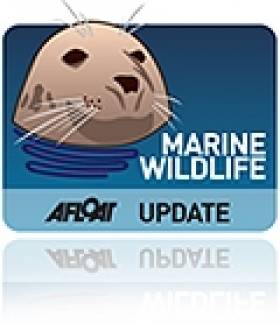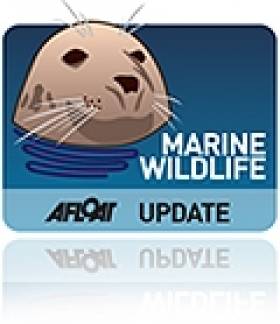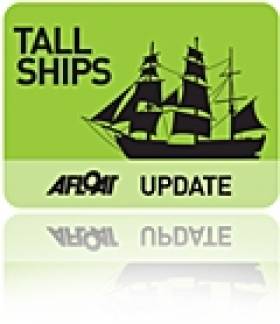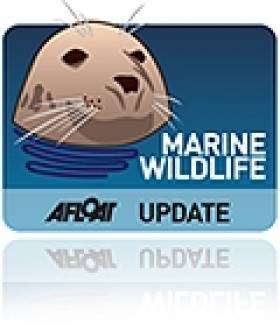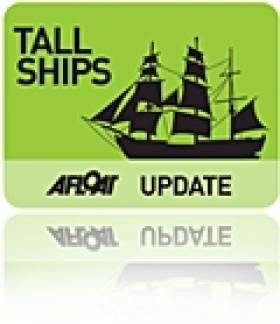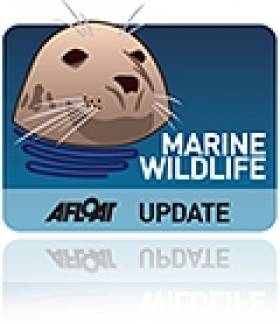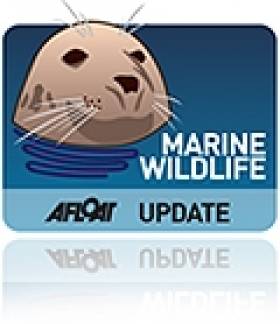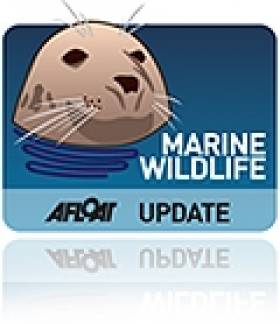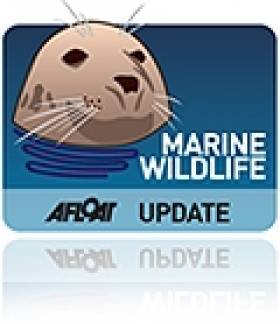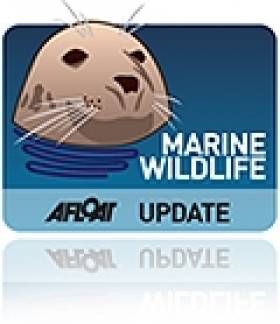Displaying items by tag: Irish Whale and Dolphin Group
Call for Whale Stranding Protocol After Baltimore Incident
#MARINE WILDLIFE - The Cork News reports that a new protocol will be introduced to deal with large marine wildlife strandings following the public backlash over the handling of the injured and malnourished fin whale in Baltimore Harbour this week.
The 30-tonne whale died on Thursday morning after being trapped in the harbour on Tuesday. As previously reported on Afloat.ie, the whale was left to die as it was found to be too ill to be assisted back into deeper water and was too large to be euthanised with drugs.
Members of the public have complained about the 'do nothing' approach taken by experts. But Dr Simon Berrow of the Irish Whale and Dolphin Group (IWDG) defended his organisation's handling of the affair, citing the lack of protocol for such an unforseen incident.
"We are recognised as the most confident group in Ireand in dealing with dolphins and whales but as a charity, it should not be our responsibility," he said. "I don't have the authority to tell someone to shoot a whale."
Dr Berrow said he had been in talks with the Defence Forces about arranging for the distressed whale to be shot before it died, most likely from wounds sustained on sharp rocks in the harbour.
Speaking with The Irish Times, the IWDG's Padraig Whooley said: "As humans, we always think we have to intervene but wildlife rarely does better when we do. In this particular case the ‘do nothing’ approach was the only option open to us."
Whooley also criticised the "fairly shocking" level of ignorance over the incident that saw crowds continue to gather at the harbour in Baltimore even after it became clear that the whale was in significant disgress.
'Nothing Can Be Done' for Stranded Whale in Baltimore Harbour
#BALTIMORE WHALE - Hopes are fading for an injured whale trapped in Baltimore Harbour, according to the Irish Independent.
It's being reported that the fin whale, which was injured on sharp rocks and beached off the pier in the West Cork harbour yesterday, is being left to die as it is too ill to be helped back to deeper water and too large to be euthanised.
It had been hoped that the whale would return to the sea under its own power by high tide but that sadly did not happen.
"Nothing can be done," Dr Simon Berrow of the Irish Whale and Dolphin Group (IWDG) told the Independent. "It can't be refloated or drigged. All you can do is let nature take its course."
The 40-foot whale became something of an instant attraction in Baltimore as crowds gathered in the harbour, as TheJournal.ie reports.
However, marine wildlife experts believe that the young whale must have been sick or malnourished to have made it so far from the open sea into the sheltered harbour.
The IWDG's Padraig Whooley also reiterated that most whale strandings end in death, and Brendan Cottrell of the Baltimore RNLI said the best thing was to do their best not to stress the animal further.
Elsewhere, a female fin whale stranded on a beach in Cornwall has died despite efforts to save her, according to the Daily Mail.
The 65-foot whale was put down by vets from British Divers Marine Life Rescue after she was found beached at Carylon Bay on the south coast on Monday morning. The whale was was described as "incredibly undernourised".
Wait Almost Over for Celtic Mist Relaunch
#CELTIC MIST - The wait is almost over for the relaunch of the Celtic Mist, as The Irish Times reports on the completion of its 'make-under'.
Tomorrow 12 August will see the ketch formerly sailed by late Taoiseach Charles Haughey officially begin its new life as a research vessel for the Irish Whale and Dolphin Group (IWDG), as previously reported on Afloat.ie.
Apart from extensive work to the interior of the vessel to transform crew accommodation and make space for scientific instruments, the hull of the Celtic Mist has been beautifully repainted in different shades of blue, with details such as a dolphin on its bow and a fun whale along the beam contributed by Kerry artist Michael O'Leary.
Among the new gizmos installed on the yacht - which sailed a leg of last year's Tall Ships Races - is an automatic identification system that will allow internet users to track its position online.
Conor Haughey, whose family gifted the yacht to the IWDG for its marine wildlife conservation work, is expected to attend the relaunch ceremony at Kilrush marina at 2pm, hosted by Afloat.ie's own Tom MacSweeney with a blessing by Fr Michael Sheedy of Kilrush.
Dolphin Group Celebrates Ireland's First Refloating Success
#MARINE WILDLIFE - A stranded dolphin has been successfully refloated for the first time ever in Ireland thanks to the efforts of volunteers with the Irish Whale and Dolphin Group (IWDG).
As the Irish Examiner reports, the group was alerted by a woman who saw the 3.5-metre bottlenose dolphin on a beach at Béal on the Shannon Estuary in north Kerry on 1 June.
Volunteers on the scene discovered the female dolphin's skin was still moist, which indicated it had only recently stranded.
After checking for injuries, the team decided not to wait for special whale pontoons to arrive from Kilrush and instead used a local farmer's tractor and low loader to lift the dolphin out of the sand.
The dolphin was slowly moved back to the water, where she was stabilised before she regained composure and was able to swim away.
Images of the dolphin's dorsal fin were captured by the volunteers for the IWDG's records, which enabled researchers to confirm subsequent sightings among a pod of some 140 dolphins swimming in the estuary - with the latest spotting on 27 June on a dolphin-watching boat trip, where she appeared to be in good health.
In a statement, the IWDG said: "The loss of one dolphin, especially an adult female, could have a significant impact on this population, thus highlighting the importance of the prompt action on the shore at Béal."
Celtic Mist Almost Ready for Relaunch Next Month
#CELTIC MIST - The Irish Whale and Dolphin Group's (IWDG) new research vessel is finally set for its official launch three weeks from this coming Sunday.
As previously reported on Afloat.ie, Celtic Mist - the yacht formerly sailed by late Taoiseach Charles Haughey - was gifted by the Haughey family to the IWDG to assist in its marine wildlife conservation work.
The boat relocated to its new home berth in the Shannon Estuary at Kilrush, Co Clare in July last year - after one last hurrah in its former guise by completing a leg of last summer's Tall Ships Races from Waterford to Greenock in Scotland.
Celtic Mist entered dry dock last November for its necessary refit as a maritime research vessel, while the IWDG sought funding to complete the more than €60,000 project.
With a year gone by since the IWDG first took over the yacht, she is finally back on the water and undergoing the last few finishing touches before her first mission - which may involve tracking the elusive blue whale in Irish waters.
Internally, she is a very different vessel to the one that Charles Haughey sailed, with the aft cabin stropped out and replaced by berths for skipper and crew.
According to IWDG co-ordinator Dr Simon Berrow, there is also "a science area where towed and dipping hydrophones and environmental logging software will be run."
The engine room, meanwhile, has been "completely cleaned out and painted including opening and de-greasing of the fuel tanks".
Berrow adds that there is "still considerable work to be done", explaining that the masts and rigging require inspection, aside from all the "painting, sanding, varnishing and more painting to be completed".
The plumbling and electrics also need to be finished, but Berrow says the refitting team is "making rapid progress".
All are welcome to the official launch of the Celtic Mist on Sunday 12 August at 2pm at Kilrush Creek Marina in Co Clare. For more details visit the yacht's official website at www.rvcelticmist.ie.
#MARINE WILDLIFE - Ten different cetacean species were accounted for among 143 sightings validated by the Irish Whale and Dolphin Group (IWDG) for the month of June.
"It’s tempting to overinterpret sightings from a single month’s snapshot," said IWDG sightings co-ordinator Pádraig Whooley. "But we are confident that these 143 sightings... represent a reasonable sample size."
The number is less than half of the 315 records for the same month in 2009, which Whooley says "illustrates how big an influence the weather is on our ability to detect cetaceans".
Basking shark sightings are particularly down after the worst June weather on record. "There is strong evidence that the 2012 shark season is as good as over," said Whooley, noting that this year's sightings peaked as early as April.
There was a flurry of minke and humpback whale sightings off Dublin and the Kish Bank in mid-June - possibly related to the rare sighting of a minke whale breaching in the Irish Sea.
However, the vast majority of activity for these large marine mammals is off the south and southwest, with Slea Head and Dingle Bay enjoying the highest diversity.
Orcas, minke whales, humpbacks and a "blubber biomass" of six fin whales were all spotted off the Kerry coast in June, not to mention the month's largest concentration of dolphins - some 400 common dolphins spotted off Clogher Head on 10 June.
The Irish Whale and Dolphin Group has much more on the June findings HERE.
Clare Beach 'Narwhal' Was No Such Beast, Experts Confirm
#MARINE WILDLIFE - The mystery creature washed up on a Co Clare beach last month has been confirmed to be a long-finned pilot whale, and not a narwhal as had been alleged.
As previously reported on Afloat.ie, the situation was a source of puzzlement for the Irish Whale and Dolphin Group (IWDG) as the carcass was removed from Liscannor beach before their scientists could examine the remains.
Experts had been hoping to verify an eyewitness report that the carcass was indeed that of a narwhal, an Arctic cetacean renowned for its unicorn-like tusk. It would have been the first recorded sighting of a narwhal in Irish waters.
But RTÉ News reports that images sent to the IWDG confirm at last the identity of the animal as a long-finned pilot whale.
It marks the fourth reported stranding of a pilot whale in Co Clare and the 16th around Ireland this year alone.
The IWDG added that it was "always sceptical that the whale was a narwhal", and said Clare County Council did not deserve the criticism it received for removing the carcass over public health concerns.
#MARINE WILDLIFE - Researchers with the Irish Whale and Dolphin Group (IWDG) have arrived in Cape Verde to continue their studies on the North Atlantic humpback whale.
In what is the fourth expedition by the IWDG to the islands off the west coast of Africa, Conor Ryan and Darren Craig will be collecting biopsy samples to study the whale's genetics and analyse for persistant organic pollutants in their habitat. They will also be recording whale song and collecting photo ID images.
According to the IMDG: "All these techniques are helping us to build up a picture of how isolated this population is, about the geographic range of these whales, and how large the population is."
Regular updates from the duo, including photos of local flora and fauna and marine wildlife, will be posted on their research weblog HERE.
Another Humpback Whale Sighting - This Time in Northern Ireland
#MARINE WILDLIFE - The Irish Whale and Dolphin Group (IWDG) has confirmed a new humpback whale sighting, this time in Northern Ireland.
According to the IWDG, this is the third consecutive year that a humpback whale has been spotted in Northern Irish waters, with this sighting being only the fourth ever validated record for the species in the North.
IWDG sightings co-ordinator Pádraig Whooley described it as "an important development [that] highlights a trend towards increased sightings of this large baleen whale species in Irish waters."
He also remarked on the "unusual" location of the sighting in the fast-running waters of the Strangford Narrows at the Ards Peninsula.
The discovery comes just a week after confirmed sighting of two humpback whales at the opposite end of the island of Ireland, off Galley Head in West Cork, as previously reported on Afloat.ie.
Humpback Whale Sightings in West Cork Confirmed
#MARINE WILDLIFE - This past weekend saw confirmation that two humpback whales have made an unseasonal visit to Irish waters.
As previously noted on Afloat.ie, the Irish Whale and Dolphin Group (IWDG) had received reports of a sighting of the large cetaceans by birdwatchers off Galley Head in West Cork - an event described as "unusual" by sightings co-ordinator Pádraig Whooley.
But as the Irish Independent reports, those sightings have now been confirmed after IWDG members spotted the humpback pair near The Stags at Castlehaven harbour.
The team was able to get close enough to collect skin samples as well as photo identification, which confirmed that one of the duo is completely new to these waters.
Whooley commented: "Why these two young humpbacks are here during spring, when years of data shows them to be absent in these months, is a mystery."
The Irish Independent has more on the story HERE.



























